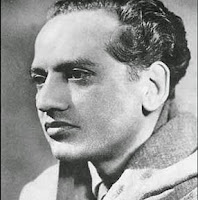Tribute to Hazrat Amir Khusrau
 |
| Faiz Ahmed Faiz |
He was a humanist in the truest sense of the word, equally opposed to the aristocratic ideals of nobility of birth and purity of blood and the heartless fanaticism of bigoted priestocracy. He was equally at home in the company of the highest in the land, kings and emperors, and the most lowly born weavers and washermen, peasants and working women. And he wrote and sang for all of them. He wrote ornate eulogies of kings and captains, profound historical and philosophical dissertations for the learned, tender and moving lyrics both devout and profane, alongside riddles and jingles for children, word games for housewives, and homely songs for love-sick maidens and tired old men. And he taught the music makers of his time to sing these compositions in a mode that touched every heart. Thus apart from his very significant contributions to contemporary history, it is by this ineffable body of music and verse that he is best remembered by posterity.
Amir Khusaru was born in 651 Hijra, i.e., 1252-53 A.D., at Patiali, a village near the present day town of Badaon (according to some authorities in Delhi). His father Amir Saifuddin Mahmood, a chieftain of the Lachin Turkish tribe, was forced to flee his territory in the face of Mongol onslaught and took service with Sultan Shamsuddin Iltmush at Delhi. He married an Indian lady Daulat Khatoon daughter of Imadul Mulk one of the most powerful nobles at the imperial court. Khusrau, one of three brothers, Izzuddin Ali Shah, Abdul Hasan Khusrau, and Husaluddin Qutlugh, lost his father when he was only seven years old and was brought up by his maternal grandfather who was equally distinguished as scholar and statesman. It was under his care that the child Khusrau was introduced to all the branches of contemporary knowledge. It was also in the same household that he sat at the feet of his spiritual mentor and beloved master "The King of Saints" Hazrat Nizamuddin Aulia of Delhi who stayed with Imadul Mulk for two years after obtaining his Khilafat from Hazrat Farid Gang Shakar.
Khusrau was a precocious child and fame as a poet came to him early but it was at the age of 20 that his political and literary career really began. During this same year he published his first Dewan and at the same time took service with Malik Chajju, a nephew of the emperor Balban and a generous and powerful prince. From 1273 to 1290, Amir Khusrau served in the courts of various nobles and princes, travelled with them and fought their battles all over the sub-continent from Bengal to the Punjab and from Sind to Deccan with a long sojourn in Multan. This was the formative period of his long life during which he mastered, apart from classics, Arabic, Persian, and Turkish, the dialects of the country (he mentions 12) and acquired a detailed and intimate knowledge of peoples and places of various regions. He wrote tirelessly all this while but it was after 1290 A.D., when he finally returned home to Delhi from his wanderings and spent the next thirty-five years in the imperial court, that his genius truly flowered and the voluminous body of his historical, lyrical and descriptive verses was composed. He wrote with equal facility in Perisan, Arabic and his native Hindi or Hindivi although much of what he wrote in the indigenous dialects appears to have been lost.
In the year 725/1325, the voice of this great "Songster of sugared tongue" was stilled and he was rejoined, as he ardently wished, with his beloved master "The King of Saints", who had died six months earlier.
FAIZ AHMED FAIZ
700th Anniversary of Amir Khusrau
EMI (Pakistan) - Long Play Records
1975
No comments:
Post a Comment